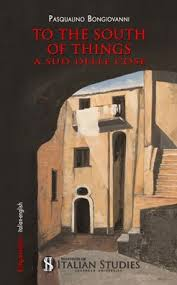To appreciate the title of Bongiovanni’s collection of poems, it may be useful to know that in the Italian mentality “south” is often synonymous with backward and somewhat uncouth. More so in the mentality of those people from the south who feel a primeval sense of being completely rooted to a place that they are unable to shake off but that they are never quite sure deserves their affection.
In these poems, love, bitterness, anger, resignation, incomprehension, jealousy, melancholy are entwined and matted to such an extent that something new emerges, a sensation that we cannot easily define.
Bongiovanni is aware that time can be diluted and time can be frozen:
Here in the plain there’s nothing new ,
my friends,
it’s just life that streams…
grey and tired
just like the water of the river
after the falls
and the white foams. (It’s just Life that Streams)
But he is also aware that change is constant and inevitable and sometimes unnoticed. At times he seems to embrace the mutations, at times he resents them as if recognising change is in itself an act of betrayal.
His chiselled verses contain the sounds of voices he will have heard in a bygone time. He listens and also hears the new voices. He absorbs them but they are not really his. He is more comfortable with the almost archaic lamenting sounds of some undefined time that now exists only in our collective memory. In reality this “lamentela” can be clawing and self-pitying.
There’s nothing more bitter/than being alone in the evening
and feeling like going out
and speaking to someone
and dialling the phone
finding nobody. (In a Summer Night).
His verses are images in black and white – clear, sharp and rare. They are the sounds of a people who know the value of each word and each pause. Some of them are precious. Some are self-conscious.
Where is the light
that dries
the land under our feet,
the dog-tooth in the fingers? (Prayer)
Pasqualino Bongiovanni, “To the South of Things. A Sud delle cose”, Insitute of Italian Studies, Lakehead University, Canada (bilingual edition), translated by Giuseppe Villella.


